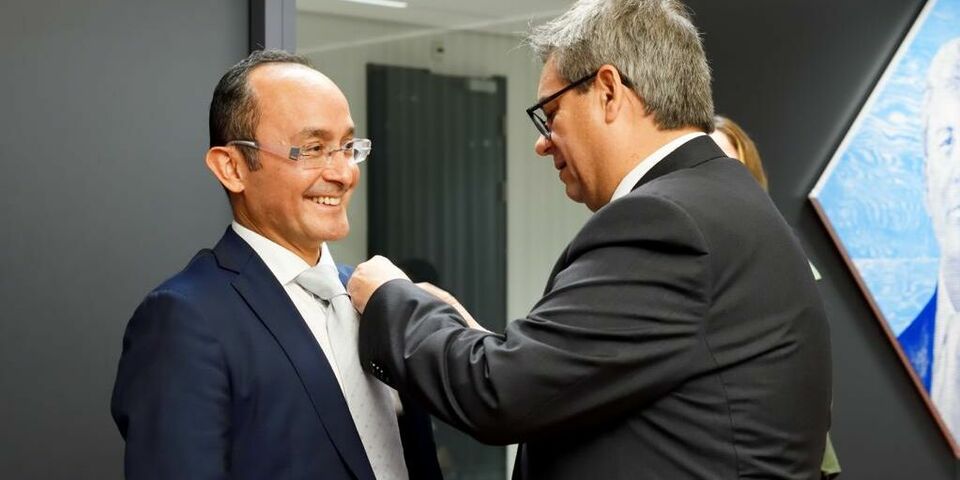Full Professor creates opportunities for students from ‘his’ Colombia.
More than thirty years ago, TU/e Full Professor Idelfonso Tafur Monroy left his homeland of Colombia for the opportunity to study. He never lived there again. Now he can call himself an honorary citizen of the country, an honor bestowed last week for his dedication to science in Colombia and for creating opportunities for the country's students.
With a scholarship from the Soviet Union under his belt, Idelfonso Tafur Monroy left Colombia in 1986, to study in Kharkiv, Ukraine. It was the only way he could go to university. “I came from a family with limited means,” explains Tafur Monroy, who is now a Full Professor working on terahertz photonic systems at TU/e. “I simply couldn't afford to study in Colombia.”
Once in the Soviet Union, he first had to learn to understand and speak the language in one academic year. “Not just everyday language but also relevant language in the fields of physics, math, chemistry and geometry, everything was in Russian.” A huge challenge, but as an eighteen year old, Tafur Monroy set his mind to it and found support among other international students. “We really did it together, no one was left behind.”
Solidarity
That year laid the foundation for his subsequent career and the solidarity he experienced with his fellow students is something he still brings to his work today. “Collaboration is very important, I think. At university you want to develop as an individual, but you must also support each other.”
If, in addition, you also collaborate with people of various nationalities, then you will achieve an intellectual diversity that is necessary in science, says Tafur Monroy. “I have students from Russia with strong theoretical fundamental knowledge, Chinese students who excel at the application and Dutch students who have good presentation skills. They complement each other.”
Like Tafur Monroy, the students from all these different countries have left their home countries to study. This can involve significant sacrifice, the full professor knows; he had to leave behind his family in Colombia. To ensure that students don't face the same fate, he is now dedicated to creating opportunities for them, in Colombia and further afield. “Studying abroad should be an option, not an obligation.”
Agreement
The full professor has set up projects to foster local research, has worked on international student exchanges and has forged contacts between industry and universities in Colombia. His latest initiative came to fruition last week when TU/e and ICETEX, the Colombian government body for study financing, signed an agreement.
The new project will enable ten Colombian doctoral candidates to spend half their doctoral period at the Department of Electrical Engineering. For the other half, the National University of Colombia (UNAL) will be their base. “It is an interesting university to collaborate with because it has a strong sense of responsibility towards helping the country to develop.”
Overlap
“The UNAL has close ties with impoverished areas of Colombia, where the wealth of biodiversity contrasts sharply with the lack of access to facilities and services, such as internet.” These are themes that overlap with TU/e in the fields of agrifood, healthcare and telecommunications. “For example, if you want to guarantee the safety and quality of food and agricultural produce, while reducing the environmental impact, developments in photonics and Terahertz technology can help achieving that.”
Tafur Monroy expects them to become the work terrain of the future PhD candidates. On completing their doctoral work, the PhD candidates will receive a double degree: a doctorate from each institution.
Also attending the signing of the agreement last week was the Ambassador of Colombia to the Netherlands, who presented Tafur Monroy with his honorary citizenship. “I was actually supposed to see the President of Colombia to get it but that didn't happen due to the pandemic. I myself proposed holding the ceremony at TU/e.”
And so the circle is complete for the full professor. After all, he also gained his PhD from two different universities. He started in Stockholm, but found his doctoral work to theoretical. His supervisor knew someone in Eindhoven and the new position offered scope for a more practical approach. “Twenty five years ago I was the first doctoral candidate at the COBRA research institute to obtain a PhD in photonics. So isn't it fitting that I should receive the honorary citizenship here?”
"The field I work in is very high tech. The reality is that the necessary means are not available in Colombia."
After studying in the Soviet Union, the full professor did not return to Colombia – except to visit family. “The field I work in is very high tech. The reality is that the necessary means are not available in Colombia. That's something we need to change,” Tafur Monroy laughs, but he means what he says. With the Dutch embassy in Colombia, he is discussing setting up a joint laboratory with TU/e in Colombia. “Part of my dream is to lift science and opportunities in Colombia to a higher level.”



Discussion